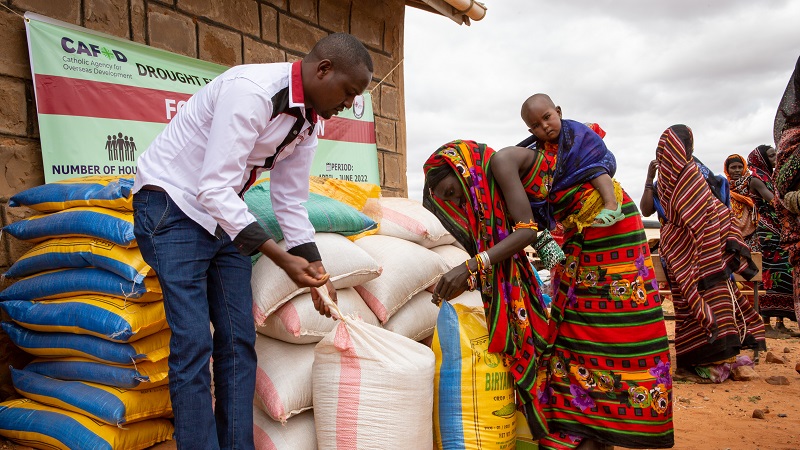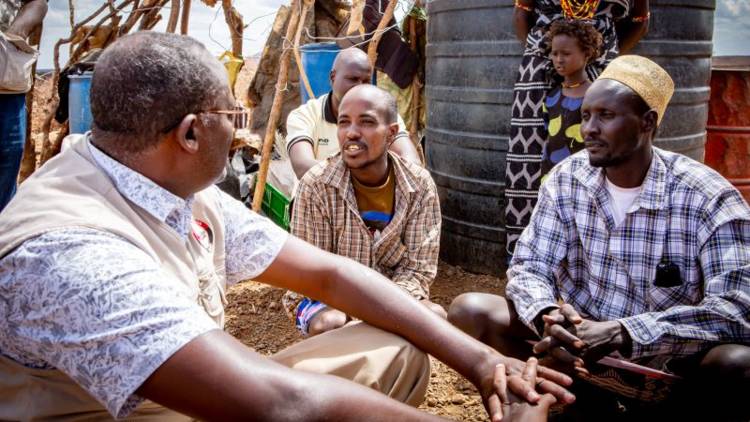World Food Crisis: Lives and a way of life at risk

For the last three years, CAFOD’s Volunteer Coordinator Specialist Eileen Hayes has been hosting online talks from a little desk in the corner of her kitchen. Recently she met with colleagues and local experts from all over the world to learn more about the world food crisis.
Towards the end of August I met the heads of two local Catholic social justice agencies – Isacko Jirma from Marsabit, northern Kenya, and Muluneh Tesfaye from Soddo, southern Ethiopia.
We met to discuss the food crisis and, in particular, our work with pastoralist communities who herd their livestock across pasture lands and constantly move to find fresh water and grass. The current drought and food crisis has hit the pastoralists hard and they get little support from their national governments.
Before the meeting, this is what I knew
- The last four rains have failed and weather scientists forecast that the next rains, due in October, will also fail
- 20 million people are fighting for survival
- The drought has already killed over 7 million livestock
- Just one ship of emergency grain, organised by the UN from Ukraine, has docked on the East Africa coast
But the trouble with a list of facts, shocking and worrying as they are, is that they can hide the true human experience of the crisis. After my conversation with Isacko and Muluneh, I know a lot more.
Animals are much more than food – they are the heart of the community
Isacko, who grew up in a pastoralist family, explained that while a family’s animals provide milk, meat and can be sold, they mean so much more than that:
“If you have livestock, for example, camels, there are certain ceremonies that you are required to undertake. If you don’t, you cannot.
“So if you have dropped out of pastoralism, that means you have already been marginalised, you have been separated from the rest. And therefore the dignity and the respect that you hold in these communities is severely degraded. So it’s not that you only miss what you eat, what to drink and how to feed your family. It goes with the dignity.”
Muluneh agreed:
“Poverty is dehumanising. All these honoured pastoralists who used to have hundreds of livestock now start to eat roots and anything that they find.
“An old man told me: ‘I used to be like a very, very honoured and very respected man. Now, I’m here looking for food for my children, so that my children will not die.'”

Parents show superhuman strength to help their children
Muluneh shared a conversation he had with a woman he bumped into on her way back from collecting water. When he met her she was carrying 25 litres of water in a jerrycan. She had been out all night collecting water – an 18-hour round trip – and returned to children crying from hunger and thirst.
Isacko also remembered times from his childhood:
“I have experienced droughts. Probably not as severe as this one but I know what it means.
“You know, you are about 30 or 40 kilometres away from a borehole and your parents go and get water for the families using their camels which normally takes a day. When they get there, the borehole breaks down. They don’t know what’s happening, just that water is not coming out.
“So do they stay there for two days waiting for water or go back at home? They have left their children who are thirsty, nobody cooking for them, even if there was food, there’s no water. You know? So I understand, I came through this background. And it is so unfortunate that there are many, many families that are living still in the same situation.”
When you can’t do everything, you can be a mirror
A simple solution like a deep borehole can make all the difference. With CAFOD’s support, local experts have been digging boreholes. Muluneh described another woman he met at one such facility whose trip for water took only 30 minutes.
Unfortunately, the boreholes do not exist far enough into the vast pasture to serve everyone. Isacko explained that this task – as well as providing education, heathcare, and working for women’s empowerment – is too huge for the Church to do on its own.
However, by doing what they can and doing it well they can “be the mirror for the government to say ‘this is the way we can change. We are showing you the waterpoint. You see, if you do this we can change the lives of people.’ “
Accompaniment comes before service
Muluneh explained:
“For me, more than serving the community we need to be a part of them, to be with them. We are created to be with others. We need to share the community’s life; the love, the beauty, the suffering. And we call also the whole world – you don’t need to be physically present with the community.
“You need to listen to the stories of the people who are suffering and open yourself. The communities are suffering, having no rain for four consecutive seasons and have no food to eat. And you can’t be indifferent. At least you can give them something or at least be with them, accompany them and show that love and solidarity with the community.”
Muluneh’s words stuck with me long after I had turned off my webcam and got up from my desk. In a few weeks I will speak in a parish for Harvest Family Fast Day and I know now that I want to pass on the stories Isacko and Muluneh have shared with me. To explain that we are one human family and we need togetherness not walls.
Please join me.